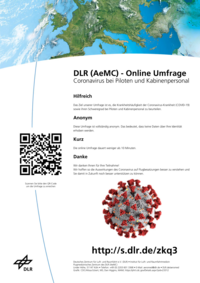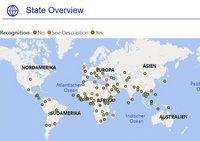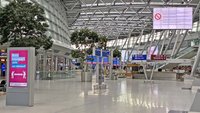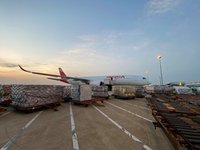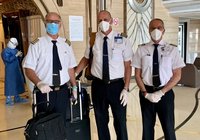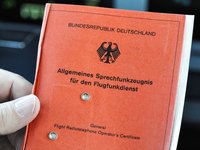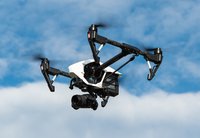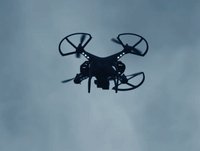
| The Newsletter of the German Air Line Pilots' Association Vereinigung Cockpit |
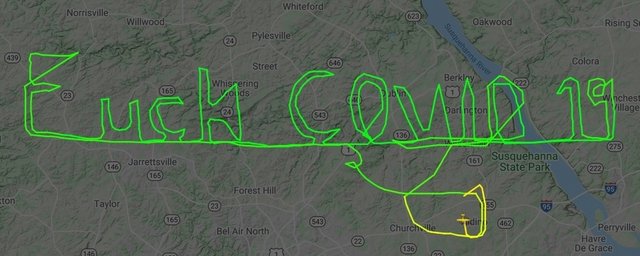 |
Dear Members,Aviation is systemically relevant. As one of the mainstays of air transport, we as pilots are in the front line when it comes to keeping the system running and flying in vital medical equipment. I think I speak for everyone when I say that we are very happy to do this! But we also expect companies and politicians to recognise this importance and make provisions for the time after the crisis. This is only possible with us, because without a cockpit crew no plane will take off! We are continuing to work at all levels and channels to preserve as many of our jobs as possible at all airlines. I would like to make a request in this regard: We need up-to-date photos as documents of our relevance for public communications. Please send us pictures, for example of protection equipment, parked aircraft, masks or cargo in the cabin, to presse@vcockpit.de. We would like to use them for all VC channels to make it clear to the public, politicians and business that we are needed. I would also like to ask you all to take part in the DLR survey on Covid-19 among flight crews, because only with a solid database will we be able to make a meaningful assessment of the risks involved in dealing with the pandemic. You can find the link in the article below. This time we also have the following topics in the waypoints:
You can also find more current news on our social media channels on Twitter, LinkedIn and Facebook. We wish you a good read. With kind regards, Markus Wahl, VC Board and Team |
 |
DLR Study on Covid-19 in Flying PersonnelThe epidemiological data on Covid 19 infections in flying personnel are relatively "thin". This is caused on the one hand by the rapid shutdown of the aviation system, on the other hand by a relatively young population in both cabin and cockpit, which could possibly show asymptomatic progressions based solely on the requirements of the medical examinations with at least well adjusted or treated diseases. As the situation affects us worldwide as a pandemic and as we are also one of the "spreader industries" in the aviation sector, it is very important to obtain an overview of infection figures among flying personnel. We therefore recommend participation in the short and anonymous DLR survey / study, which aims to assess the incidence of coronavirus disease (Covid-19) and its severity among pilots and cabin crew. Click here for the DLR survey. Thank you very much, the data is ultimately useful to us all. |
International Study on Covid-19 in Flying PersonnelThe Global Cabin Air Quality Executive (GCAQE) initiative has launched an international survey on Covid-19 for airline employees. The results of the 12-question survey are to be published after completion. |
Safe Flying needs hard PaperworkIn her function as a member of the VC Licensing and Training Committee and as Executive Board Director Technical Affairs at ECA, Tanja Harter is working with other experts on a comprehensive concept for the resumption of flight operations. Together with the EASA, the necessary regulations are being worked on at full speed, of course with special attention being paid to flight safety. An important issue here is the return to normal training conditions for crews, in order to compensate for lack of flight practice due to extensive grounding. "We are facing an unprecedented situation where not only individual crew members are lacking 'recent experience', as they were unable to fly actively due to parental leave, for example. Now this affects the crews of entire fleets that are currently grounded," says Tanja Harter. "This is a massive problem that we have to counteract with specially tailored training so that the current accumulation of exceptions and extension of training intervals does not become a problem for flight safety". Here, of course, health and safety issues and their impact on - and possible restrictions for - training methods and options must be weighed against each other and regularly reviewed in order to achieve the highest possible safety standard. In addition, numerous exemptions must also be reviewed and, if necessary, withdrawn, such as the weakening of flight duty time restrictions for crews who have carried out repatriation flights or transported freight in passenger aircraft. "Measures to protect the health of crew members and passengers are important. However, where they impose restrictions on flight safety, these two aspects must be regularly and carefully examined." |
International Recognition of Covid-19 related DerogationsIATA, in cooperation with ICAO, has created a website that shows the acceptance or rejection of states regarding deviations from standards due to the Covid-19 pandemic. The site provides information on Covid-19 Safety Operational Measures Contingency Related Differences (CCRD), which reflects the ICAO data status. For pilots it is especially relevant, which LBA approved exemptions their airline uses and which states recognize these exemptions so that they can fly over those countries and especially land there without getting problems. Some states do not acknowledge all exceptions. |
Bleak ICAO ForecastICAO has presented its first forecast of passenger numbers for the entire year of 2020. The association assumes that between 860 million and 1.52 billion fewer people will travel by air this year than originally assumed. In addition, ICAO expects a decline in international seat capacity of up to 75 percent, which, according to the forecast, could lead to a drop in revenue of $273 billion. |
Trip Reports of Cargo-Ops with Passenger AircraftIberia, in collaboration with partners from the health sector, has set up a "Sanitary Air Shuttle" to fly medical supplies to Spain. Ariel Shocron is a pilot on A350 and reports on the ECA website about one of these rotations to Shanghai. In order to avoid the danger associated with a layover and to avoid the quarantine rules in China, the shuttle was flown with four complete cockpit crews. The rotation was operated under the new "Article 71" EASA Flight Time Limitations exceptions and took 40 hours. |
|
The colleagues at El Al also fly to China with passenger airplanes to bring medical supplies to Israel. Amos Aldaag is captain on Boeing 787 and reports from his flight to Shanghai. |
 |
Recognition of the Results of Language Tests by foreign ProvidersGiven the current situation, we would like to point out that the recognition of the results of language tests of foreign providers by the German Federal Aviation Authority (Luftfahrt-Bundesamt LBA) can be problematic. In principle, §125a of the LuftPersV applies to the recognition of a body for the acceptance of language tests. The LBA is responsible for the recognition of the bodies and publishes a list of recognised German bodies for the acceptance of language tests on its website. The LBA supervises these bodies. In addition, the LBA states on its website that, upon application, a language certificate obtained in an EU member state can also be recognised if it can be proven that the body which issued the certificate is entitled to do so in the respective member state (see also LBA's website). Although certified by the transport authority of the EU member state, in the present case the online language examination of the foreign provider was not fully recognised by the LBA (level 5 instead of level 6). One of the reasons for this was that an interaction between the examiner and the examinee could not be recognised. This should have been the case, as the provider conducts the exam via webcam and microphone. Pending clarification of the facts of the case, we recommend that until further notice you enquire in advance at the LBA as to what extent and on what basis foreign language examinations are recognised. |
Working Group RPAS is now called UAS+Our Working Group RPAS has changed its name to UAS+ (Unmanned Aircraft Systems). By now, there are a lot of unmanned aircraft systems besides remotely ("remotely piloted") aircraft systems, for which this system specification is no longer provided or available. However, these systems form an integral part of the WG's work. The + contained in the name is to further clarify that all different types of unmanned system variants are included. The adaptation of the name is based on the working groups at ICAO, IFALPA and ECA and shall contribute to standardization. |
 |
Changes in Short-Time Working Allowance and Parental AllowanceThe short-time working allowance is increased under certain conditions or depending on the length of the period of entitlement. The Bundestag will adopt the Sozialschutz Paket II (Social Protection Package II) at its 160th session under TOP9 at approx. 9:35 a.m. on May 14. The short-time working allowance will then be increased for the months in which the loss of earnings amounts to at least 50% until December 31, 2020, staggered from the fourth month of receipt to 70% or 77% and from the seventh month of receipt to 80% or 87%. In order to ensure that parents do not suffer any disadvantages in receiving parental benefits in times of the corona pandemic, the regulations will be changed temporarily. The Bundestag has discussed a corresponding bill in its first reading and referred it to the responsible committees. The 2nd/3rd reading is expected in the coming session week. The draft law provides for three areas of regulation:
|
 |
New ECA Position Paper on Unmanned Aircraft SystemsECA has published a position paper on Unmanned Aircraft Systems and the distinction between automated and autonomous systems, which you can find here on the ECA-Website or here as pdf-file. The most important condition for UAS operations is a consistently high level of safety compared to that of commercial manned aviation. In addition, a holistic approach to manned and unmanned aviation needs to be adopted for operations in a common airspace, which requires the inclusion of all aspects at the levels of regulation, technology, procedures and the overall system as well as their compatibility. Furthermore, a formalised process must be in place to ensure the safe and compatible functioning of systems based on artificial intelligence and machine learning. |
News from Associations, Organisations and Authorities
ECA
- When should aircrews be declared posted workers? Which is the labour law applicable to aircrews? These Questions arise simply because of the transnational work in aircraft. A report published by the ECA has revealed major differences in the assessment of this issue, particularly between employers and employees. Read it here on ECA's website.
- ECA regularly presents a Wrap Up of Covid-19 topics, including actions taken by the European institutions, national developments and statements by relevant EU and international stakeholders:
ECA Wrap Up 28 April
ECA Wrap Up 4 Mai
ECA Wrap Up 11 Mai - Response to Ryanair Holdings plc Covid-19 market update: Ryanair pilots support to manage costs & retain jobs.
IFALPA
- IFALPA recognizes the hard-won opportunity to play a major role in rebuilding the aviation industry on the core values of financial sustainability, environmental sustainability, and social sustainability. The Federation has published an editorial that focuses on social sustainability.
EASA
- In the context of getting back to normal operations, EASA addresses the "Preparation of Aerodromes to Resume Operations" in its Safety Information Bulletin 2020-07. The SIB contains guidelines for the safe operations of aircraft on airports.
- EASA has updated its guidelines for the transport of cargo on passenger airplanes: Guidelines: Transport of Cargo in Passenger Compartment - Exemptions under Article 71(1) of Regulation 2018/1139 (The Basic Regulation)
ICAO
- The ICAO Governing Council has established a Covid-19 Aviation Recovery Task Force to identify and recommend strategic priorities and guidelines for states and companies. The Task Force's mission is to help bring the international aviation network back on track after Covid-19. In addition to ICAO, other aviation organisations as well as the WHO and the World Tourism Organisation are represented. The first recommendations are to be presented at the end of May.
We continuously strive to improve our newsletter and welcome your feedback. Please send comments and suggestions to presse@vcockpit.de or use the reply function of your mail programme. To stay up to date with the latest news, follow us on:

